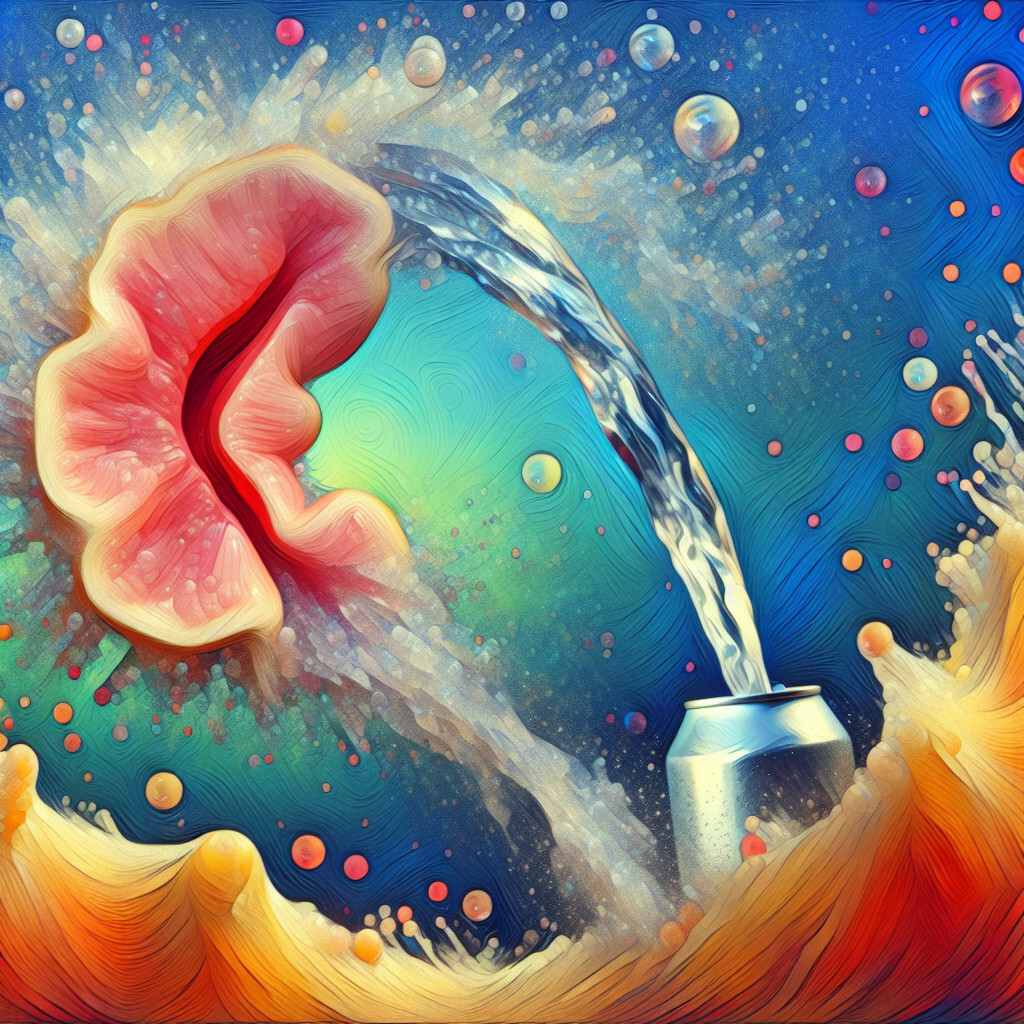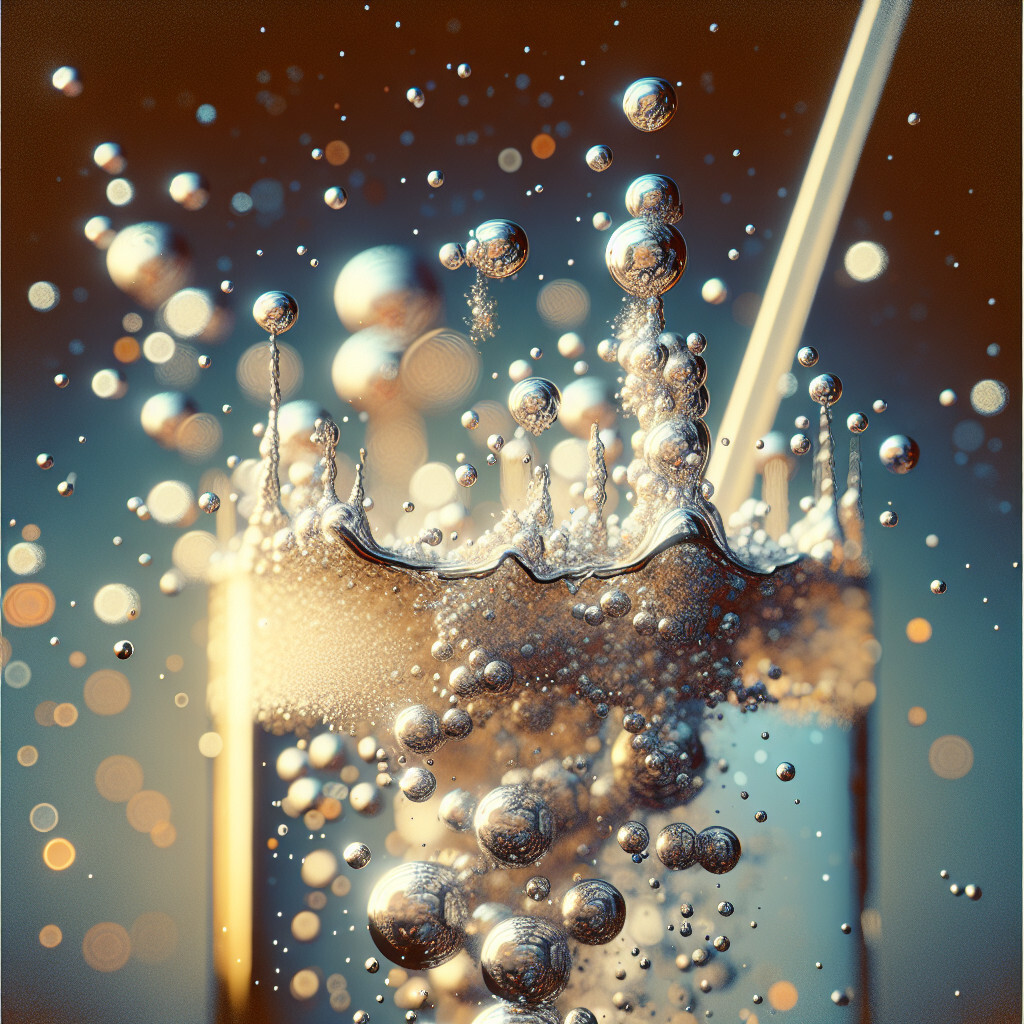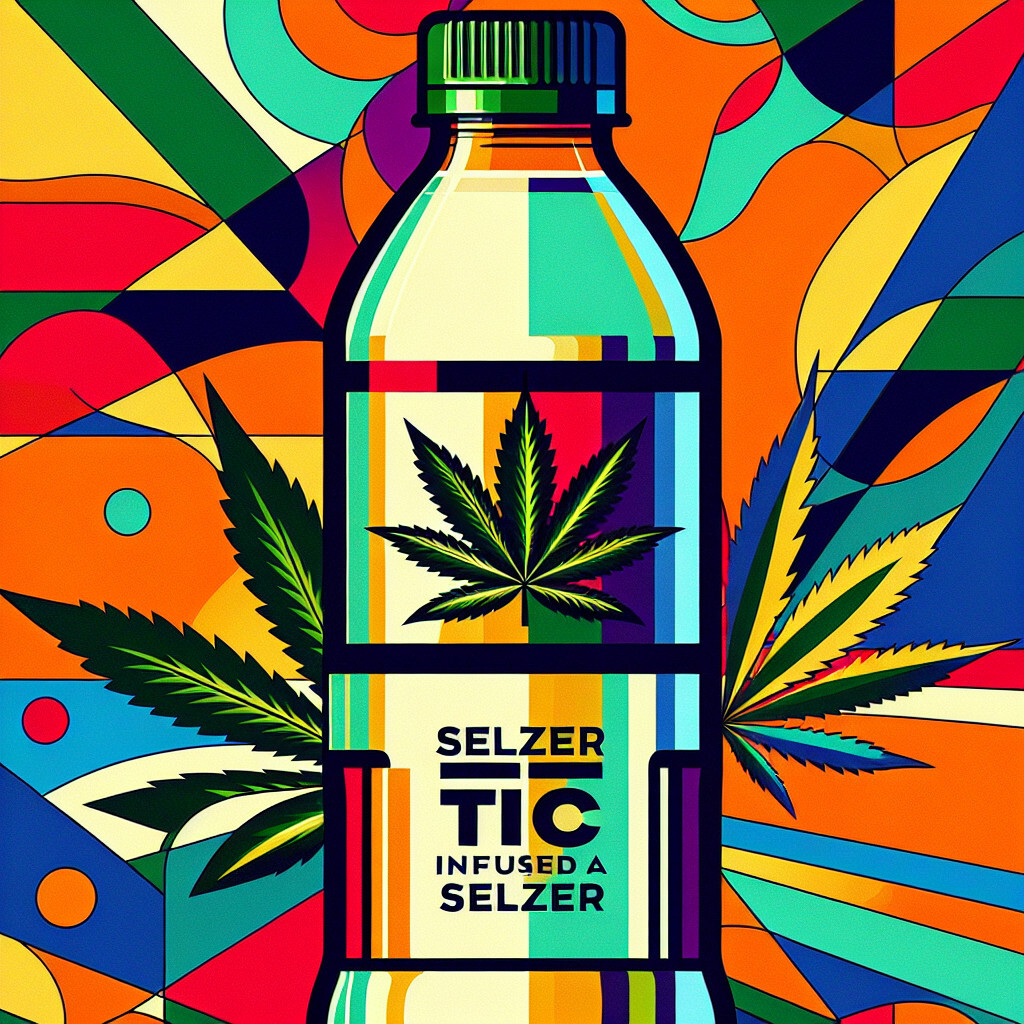-
Table of Contents
“Soothing Bubbles: Seltzer Water for Ulcer Relief”
Introduction

Seltzer water ulcer refers to the potential health concern that the consumption of seltzer water, a type of carbonated water, may contribute to the development or exacerbation of stomach ulcers. Stomach ulcers, also known as gastric ulcers, are painful sores in the stomach lining. While seltzer water is often enjoyed for its refreshing taste and ability to aid in digestion, some research suggests that the carbonation in seltzer water could potentially irritate the stomach lining, leading to discomfort or complications for individuals with pre-existing ulcers. However, it’s important to note that the relationship between seltzer water and ulcers is not definitively established and may vary based on individual health conditions and consumption habits.
Understanding the Connection between Seltzer Water and Ulcers
Seltzer water, also known as sparkling water, has gained significant popularity in recent years due to its refreshing taste and perceived health benefits. However, there has been a growing concern about the potential connection between seltzer water and ulcers. This article aims to shed light on this topic, providing a comprehensive understanding of the relationship between these two.
Ulcers, specifically peptic ulcers, are open sores that develop on the inside lining of the stomach, upper small intestine, or esophagus. They are typically caused by an imbalance between digestive fluids in the stomach and duodenum. Most ulcers are caused by an infection with a type of bacteria called Helicobacter pylori (H. pylori), or by regular use of nonsteroidal anti-inflammatory drugs (NSAIDs), such as aspirin and ibuprofen.
Seltzer water, on the other hand, is simply water that has been carbonated. Carbonation is a process that involves dissolving carbon dioxide in water, which results in the formation of carbonic acid. This gives seltzer water its characteristic fizz and tangy taste. However, it also slightly lowers the pH of the water, making it more acidic than regular water.
The concern about seltzer water potentially causing ulcers arises from its acidity. It is well established that highly acidic foods and beverages can irritate the stomach lining, which could theoretically contribute to the development of ulcers. However, it’s important to note that the pH of seltzer water is still much less acidic than many common beverages such as soda, coffee, and fruit juice.
Moreover, the body has a remarkable ability to maintain a stable pH in the stomach and intestines, regardless of the pH of the food and beverages consumed. This is achieved through a complex system of buffers, which neutralize acids and bases to prevent drastic changes in pH. Therefore, the slight increase in acidity from drinking seltzer water is unlikely to have a significant impact on the overall pH of the stomach.
In fact, scientific research has not found a direct link between the consumption of seltzer water and the development of ulcers. A study published in the American Journal of Gastroenterology found no association between carbonated beverage consumption and the risk of gastric ulcers. Similarly, a review in the World Journal of Gastroenterology concluded that there is insufficient evidence to suggest that carbonated beverages increase the risk of peptic ulcer disease.
However, this does not mean that seltzer water cannot cause discomfort in individuals with pre-existing ulcers or other gastrointestinal issues. The carbonation in seltzer water can cause bloating and gas, which can exacerbate symptoms in individuals with sensitive stomachs or gastrointestinal disorders. Therefore, while seltzer water is not likely to cause ulcers, individuals with these conditions may want to limit their consumption.
In conclusion, while seltzer water is slightly more acidic than regular water due to its carbonation, there is currently no scientific evidence to suggest that it increases the risk of developing ulcers. However, individuals with pre-existing gastrointestinal issues may experience discomfort from the carbonation and should therefore consume it in moderation. As always, it’s important to maintain a balanced diet and lifestyle for optimal digestive health.
The Impact of Seltzer Water on Ulcer Development
Seltzer water, also known as sparkling water, has gained significant popularity in recent years due to its refreshing taste and perceived health benefits. However, there has been a growing concern about the potential impact of seltzer water on ulcer development. This article aims to shed light on this topic, providing an informative and formal discussion on the relationship between seltzer water and ulcers.
Ulcers, specifically peptic ulcers, are open sores that develop on the inside lining of the stomach, upper small intestine, or esophagus. They are typically caused by an imbalance between digestive fluids in the stomach and duodenum. Most ulcers are caused by an infection with a type of bacteria called Helicobacter pylori (H. pylori), or by regular use of nonsteroidal anti-inflammatory drugs (NSAIDs), such as aspirin and ibuprofen. However, lifestyle factors, including dietary habits, can also contribute to ulcer development and exacerbation.
Seltzer water is simply water that has been carbonated, meaning it contains carbon dioxide gas under pressure. The carbonation process gives the water its effervescence and tangy taste. However, it also results in the formation of carbonic acid, which can lead to a slight decrease in the pH of the water, making it more acidic. This has led to speculation that seltzer water could potentially exacerbate or even cause ulcers due to its acidity.
However, it is important to note that the acidity of seltzer water is still much less than that of common beverages like coffee, orange juice, and soda. Furthermore, the human body is well-equipped to handle the slight increase in acidity from seltzer water. The stomach, in particular, is designed to function in a highly acidic environment, as it produces hydrochloric acid to break down food. Therefore, the slight acidity of seltzer water is unlikely to cause significant harm or lead to the development of ulcers in a healthy individual.
Moreover, scientific research has not found a direct link between the consumption of seltzer water and the development or worsening of ulcers. A study published in the American Journal of Gastroenterology found no association between carbonated beverage consumption and increased risk of gastric or duodenal ulcers. In fact, the study suggested that moderate consumption of carbonated beverages might even have a protective effect against the development of peptic ulcers.
However, this does not mean that seltzer water cannot cause discomfort in individuals with pre-existing ulcers or other gastrointestinal issues. The carbonation in seltzer water can lead to increased gas and bloating, which can exacerbate symptoms in individuals with ulcers or other gastrointestinal conditions. Therefore, while seltzer water is not likely to cause ulcers, individuals with these conditions may want to limit their consumption to avoid discomfort.
In conclusion, while seltzer water is slightly more acidic than regular water due to carbonation, it is unlikely to cause or exacerbate ulcers in healthy individuals. However, those with pre-existing ulcers or other gastrointestinal conditions may experience discomfort due to the gas and bloating caused by the carbonation. As with all dietary habits, moderation is key, and individuals should consult with their healthcare provider if they have any concerns about their consumption of seltzer water.
Debunking Myths: Does Seltzer Water Really Cause Ulcers?
Seltzer water, also known as sparkling water, has gained significant popularity in recent years as a refreshing, calorie-free alternative to sugary sodas. However, with its rise in popularity, there has also been an increase in health-related concerns and myths surrounding its consumption. One such myth is the belief that seltzer water can cause ulcers. This article aims to debunk this myth by examining the scientific evidence and providing a clear understanding of the relationship between seltzer water and ulcers.
Ulcers, specifically peptic ulcers, are sores that develop on the lining of the stomach, upper small intestine, or esophagus. They are typically caused by an infection with a bacterium called Helicobacter pylori or by long-term use of nonsteroidal anti-inflammatory drugs (NSAIDs), such as aspirin and ibuprofen. Stress and spicy foods were once thought to cause ulcers, but research has shown that this is not the case.
The myth that seltzer water causes ulcers likely stems from the fact that it is carbonated. Carbonation can cause a temporary increase in stomach acid production, which could theoretically lead to ulcers if it were sustained over a long period. However, the key word here is “temporary.” The body’s natural regulatory mechanisms quickly restore the stomach’s pH balance after the brief increase in acidity caused by carbonation.
Moreover, a comprehensive review of scientific literature reveals no evidence to support the claim that seltzer water causes ulcers. In fact, a study published in the American Journal of Gastroenterology found no association between carbonated beverage consumption and the risk of developing peptic ulcers. Another study in the Journal of Clinical Gastroenterology also found no link between carbonated beverages and ulcers, further debunking this myth.
It’s important to note that while seltzer water does not cause ulcers, it can cause discomfort in some people. The carbonation in seltzer water can lead to bloating, gas, and a feeling of fullness in the stomach. For individuals with irritable bowel syndrome (IBS) or other gastrointestinal disorders, these effects may be more pronounced. However, these are temporary discomforts and not indicators of ulcers or other serious gastrointestinal conditions.
In conclusion, the claim that seltzer water causes ulcers is a myth unsupported by scientific evidence. While the carbonation in seltzer water can cause a temporary increase in stomach acid, this does not lead to the development of ulcers. However, individuals with sensitive stomachs or gastrointestinal disorders may experience discomfort when consuming seltzer water due to its carbonation. As with any food or beverage, moderation is key. If you enjoy seltzer water and it doesn’t cause you discomfort, there’s no reason to avoid it out of fear of developing ulcers.
Seltzer Water and Ulcer Management: What You Need to Know
Seltzer water, also known as sparkling water, has gained significant popularity in recent years due to its refreshing taste and perceived health benefits. However, there has been a growing concern about the potential impact of seltzer water on certain health conditions, particularly ulcers. This article aims to shed light on the relationship between seltzer water and ulcer management.
Ulcers, specifically peptic ulcers, are open sores that develop on the inside lining of the stomach, upper small intestine, or esophagus. They are typically caused by an imbalance between digestive fluids in the stomach and duodenum. Many factors can contribute to this imbalance, including bacterial infection, certain medications, and lifestyle habits such as smoking and alcohol consumption.
Seltzer water is simply water that has been carbonated, meaning it has been infused with carbon dioxide gas under pressure. This gives the water its characteristic bubbles and fizzy sensation. Some people believe that the carbonation in seltzer water can exacerbate ulcers by increasing stomach acid production, leading to further irritation of the ulcer site. However, it’s important to note that this belief is largely based on anecdotal evidence and personal experiences, rather than scientific research.
In fact, several studies have shown that carbonated water does not increase stomach acid production. A study published in the European Journal of Gastroenterology & Hepatology found that neither carbonated water nor cola increased gastric acid secretion. Another study in the American Journal of Physiology concluded that carbonated beverages do not stimulate acid output. Therefore, it appears that the carbonation in seltzer water does not directly contribute to ulcer formation or exacerbation.
However, this does not mean that seltzer water is completely harmless for individuals with ulcers. Some seltzer waters contain added ingredients such as citric acid or natural flavors, which can potentially irritate an ulcer. Additionally, the fizzy sensation of seltzer water can cause bloating and discomfort in some people, which may be mistaken for ulcer pain.
Moreover, it’s important to remember that while seltzer water may not directly harm an ulcer, it also does not provide any specific benefits for ulcer healing. Ulcer management typically involves medications to reduce stomach acid and protect the stomach lining, along with lifestyle modifications such as avoiding spicy foods and alcohol, and managing stress. Drinking plenty of regular, non-carbonated water can also help by keeping the body hydrated and supporting overall digestive health.
In conclusion, while seltzer water is not likely to exacerbate ulcers based on current scientific evidence, it may cause discomfort in some individuals and does not offer any specific benefits for ulcer management. As with any health concern, it’s always best to consult with a healthcare provider before making any significant changes to your diet or lifestyle. They can provide personalized advice based on your specific health needs and conditions. Therefore, if you have an ulcer and are considering incorporating seltzer water into your diet, it would be prudent to discuss this with your healthcare provider.
Q&A
Question 1: Can seltzer water cause ulcers?
Answer: No, seltzer water does not cause ulcers. Ulcers are typically caused by bacteria or the overuse of nonsteroidal anti-inflammatory drugs.
Question 2: Can seltzer water aggravate an existing ulcer?
Answer: Yes, seltzer water can potentially aggravate an existing ulcer. The carbonation in seltzer water can cause bloating and heartburn, which can exacerbate ulcer symptoms.
Question 3: Is it safe to drink seltzer water if I have an ulcer?
Answer: While it’s not harmful, it may cause discomfort if you have an ulcer due to the carbonation. It’s best to consult with a healthcare professional for personalized advice.
Question 4: Are there any benefits of drinking seltzer water for someone with an ulcer?
Answer: There are no specific benefits of drinking seltzer water for someone with an ulcer. However, staying hydrated is important for overall health.
Conclusion
There is no scientific evidence to conclude that seltzer water directly causes ulcers. However, its acidity may potentially irritate existing ulcers.






